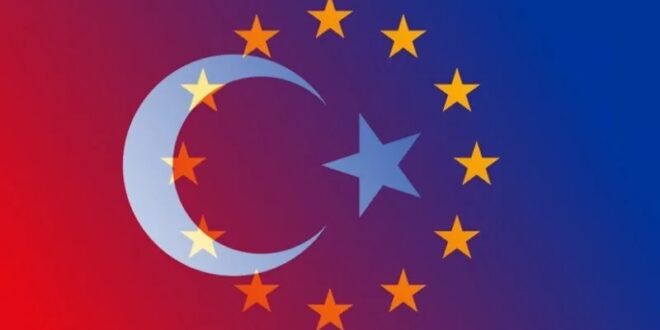On July 10th, 2023, Turkey President Recep Tayyip Erdogan announced that his country would support Sweden’s accession bid to NATO on the condition that EU accession talks are unfrozen. Within 24 hours however, Erdogan apparently signed off on a new deal that would drop Turkey’s veto over Sweden and allow them into the alliance in exchange for, among other things, F-16 jets from the United States.
While the likelihood of unfreezing accession talks any time soon is low, Erdogan’s desire to unfreeze accession negotiations should not fall on deaf ears, even if it may be insincere.
The main reason the EU froze Turkey’s accession talks is Erdogan’s crackdown on civil society and Turkey’s independent institutions. These are completely valid reasons for doing so. But since the imposition of the freeze, Turkey’s authoritarian political system has not liberalized by much, if at all.
The reason that the EU has been such an effective promoter of democracy in the Balkans and Eastern Europe is its wealth and strong commitment to democratic government. As the EU expanded into these regions, it brought with it a powerful incentive to adopt liberal democratic values in exchange for robust economic integration. In 2004 for example, Turkey abolished the death penalty, ostensibly to pave the way for the opening of EU accession talks the following year. And in countries such as Moldova and Ukraine, pro-European governments have implementedvarious reforms to prepare themselves for future EU membership.
The rift between the EU and Turkey, however, is wide. As mentioned, the EU has been, rightly, concerned about the political situation in Turkey. Erdogan meanwhile has used the EU as something of a scapegoat, often claiming discrimination against Turks in Europe. It’s a sentiment that plays well with the electorate. In 2013, as many as 60% of Turks had an unfavorable view of the EU, with just over 40% in support of Turkey joining the bloc.
If the current political climate persists, Turkey will never be a part of the EU. But that doesn’t mean that talks should be frozen indefinitely. There is a real concern that any talks without political reform will show that the EU is soft on core issues such as democracy and human rights. One option is that the EU could insist that Turkey and the EU first complete chapter negotiations relating to the judiciary, justice, and institutions, to the satisfaction of the Commission. Only after satisfactory democratic safeguards are put in place could moving on to the remaining chapters dealing with economic integration be accomplished. Making economic reform conditional on democratization and political reform is in essence how the EU is and has been expanding already. In Turkey’s case, there would need to be a clear path forward for any meaningful progress to take place. Without one, Erdogan would have little reason to acquiesce.
The main problem is that even if Turkey democratizes substantially, there will always be a risk of backsliding. This is essentially what has happened with Poland and Hungary in recent years as nationalist governments and courts in both countries have argued for the legal primacy of their own constitutions. If these rulings are accepted to have a legal basis, a democratic, European Turkey would probably have to consider adding a clause in their constitution to satisfy EU negotiators. This clause would affirm that upon membership of the EU, the primacy of EU law and the right of the European Court of Justice to adjudicate disputes regarding EU law would be enshrined in the constitution.
Regardless of the existence of such a clause, there still exist steps that the European Union could take against a non-compliant Turkey when it comes to breaches of rule of law. The EU can freeze payments to a violating country, censure its politicians, suspend their eligibility for the presidency of the European Council, and invoke something known as Article 7, a mechanism through which the Council can strip member states of their rights.
The freezing of payments would be the most likely sanction a recalcitrant Turkey would face. However, it is unclear how a country with over 80 million people would fare if EU funding were to be cut off. The similar nominal size of the Polish economy, albeit with half the population, suggests that Turkey could also find itself in a position where it receives more EU funds than it gives granted how much Poland currently receives. An unreformed Article 7, which requires unanimity among the Council, could still theoretically be brought against Turkey. Given Turkey’s generally warm relationship with Hungary, in that both held up Swedish and Finnish NATO accession bids, it’s possible that a pact on Article 7, like the one currently between Poland and Hungary to hold up measures against the other, could be realized.
Regardless, the EU is still pursuing accession negotiations with countries like Montenegro, Albania, North Macedonia, and Serbia, despite “enlargement fatigue” and some significant challenges regarding the strength of their respective democracies. The EU’s stance on Turkey would seem hypocritical were it not for the flagrant undermining of democratic institutions by the government since at least 2016. And the EU could once again freeze accession negotiations if they are unsatisfied with the progress being made with Erdogan’s Turkey. A hypothetical Turkish accession would almost certainly happen after 2028 at the earliest, when Erdogan’s final term as president expires, provided presidential term limits are still in force.
Tying Turkey’s renewed accession bid with first dealing with rule of law and human rights issues before any progress is made on economic integration might still not be enough for Brussels to restart talks. A free, democratic Turkey that is part of the European Union, however, would be desirable for all parties, even if some countries would continue to veto even a democratic Turkey’s accession for other reasons.
 Eurasia Press & News
Eurasia Press & News



